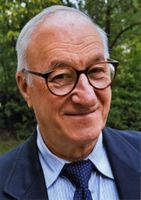Albert Bandura
People who believe in themselves can raise their aspirations, motivation and accomplishments and are more apt to try new things by watching others do them. So says Albert Bandura, a Stanford University professor of social science in psychology who won the 2008 University of Louisville Grawemeyer Award for Psychology.
LOUISVILLE, Ky.— People who believe in themselves can raise their aspirations, motivation and accomplishments and are more apt to try new things by watching others do them.
So says Albert Bandura, a Stanford University professor of social science in psychology who won the 2008 University of Louisville Grawemeyer Award for Psychology. He was selected for the eighth Grawemeyer psychology prize from among 31 nominations from five countries.
Bandura’s ideas have helped define the way today’s psychologists understand mind and behavior, award judges said.
He was the first to prove that self-efficacy, our belief in our own capabilities, affects the tasks we choose, how much effort we put into them and how we feel while doing them. He also found that we learn not only through our own beliefs and expectations but by “modeling” or observing others, an idea that led to the development of modern social cognition theory.
“He has had enormous impact not only on psychology, but on other disciplines as well,” said his award nomination.
About Albert Bandura
A 2002 survey in the Review of General Psychology ranked Albert Bandura as the 20th century’s fourth most eminent psychologist, right behind B.F. Skinner, Jean Piaget and Sigmund Freud.
Bandura is the David Starr Jordan professor of social science in psychology at Stanford University, where he has taught since 1953.
A Mundare, Canada, native, he received his doctoral and master’s degrees from University of Iowa after earning his bachelor’s degree from University of British Columbia. He also has 16 honorary degrees.
A fellow of the American Academy of Arts and Sciences, he also was elected to the National Academy of Sciences’ Institute of Medicine. In 2006, he won the American Psychological Foundation’s Gold Medal Award for distinguished lifetime contribution to psychological science and, in 2004, the American Psychological Society’s James McKeen Cattell Award for distinguished achievements in psychological science.
His many other professional awards include a distinguished lifetime achievement award from the American Academy of Health Behavior for the advancement of health promotion and a lifetime achievement award from the Association for the Advancement of Behavior Therapy.
Books he has written, edited or co-authored include “Adolescent Aggression,” “Social Learning and Personality Development,” “Principles of Behavior Modification,” “Social Learning Theory,” “Self-efficacy: The Exercise of Control” and “Self-Efficacy in Changing Societies.”
Bandura has been a fellow at the Center for Advanced Study in the Behavioral Sciences in Stanford, Calif., and the Sir Walter Scott distinguished visiting professor at University of New South Wales in Australia. The former Guggenheim fellow had other research fellowships through the National Institute of Mental Health and the Japan Society for the Promotion of Science.
He is past president and board chair of the American Psychological Association, and has served that association in many offices. He was president and board chair of the Western Psychological Association and honorary president of the Canadian Psychological Association.
He has served on the editorial boards of many academic journals, including current service to Journal of Social and Clinical Psychology, Media Psychology, Social Behavior and Personality, Applied Psychology, Cognitive Therapy and Research and Behavior Research and Therapy.


